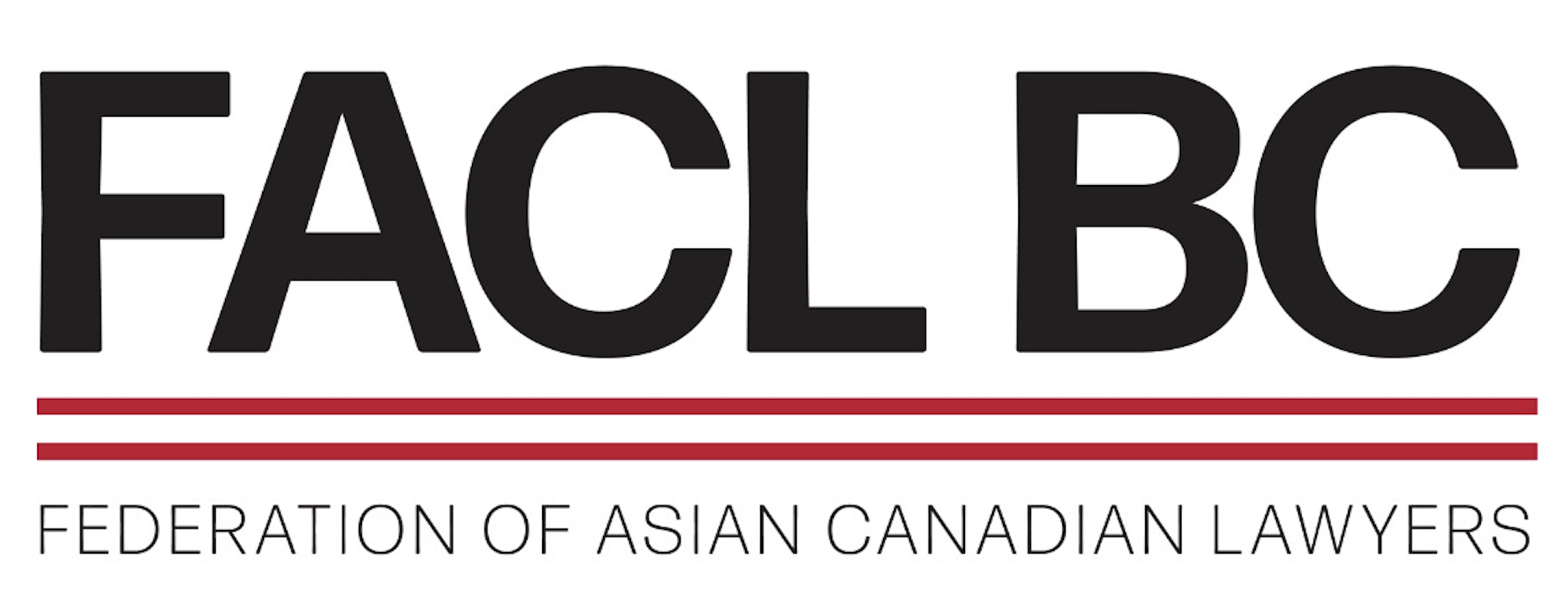Introduction
This long weekend Canadians observed our country’s 156th “Canada Day”, however, this day also marked the anniversary of a much darker date in Canada’s history. A century ago, on July 1, 1923, the Canadian Parliament enacted the Chinese Immigration Act, 1923, also known as the Chinese Exclusion Act (the Act), with the objective of banning all immigration of Chinese peoples to Canada and closely monitoring those who continued to live in Canada. The Act was not repealed until May 14, 1947, and its legacy continues as a painful reminder of the systemic and institutional barriers many people of colour in Canada continue to face. The Federation of Asian Canadian Lawyers (British Columbia) Society (FACL BC) invites you to reflect on the many meanings associated with July 1st and commemorate this day as we pass a century since the Act came into effect.
July 1st is a date that evokes strong and complex feelings, emotions, and reactions across Canada. For the countless Chinese Canadians affected by the Act, many regard July 1st not as Canada Day but know it as “Humiliation Day”.
As our young nation ages another year, it is an opportunity for reflection and education about what it means to be Canadian, given Canada’s colonial past and present. It is also a day to think about how our society can come together, while affirming our diversity, to build a stronger and more resilient nation.
The Chinese Exclusion Act and “Humiliation Day”
The Act came into effect 100 years ago in 1923. The Act was an embodiment of prevailing racist ideologies that sought to curtail the influx of Chinese peoples from entering into Canada and to closely monitor the Chinese peoples living in Canada, a population that was growing larger in size.
This was the only law enacted by Parliament that banned immigration based solely on national origin and represented the culmination of decades of efforts by the Canadian government to curb Chinese immigration. Prior to the passage of the Act, the government of Canada had enacted racist and restrictive policies against people of Chinese descent, such as the Chinese head tax under the Chinese Immigration Act, 1885, which started at $50 when first enacted but reached $500 by 1903 (worth roughly $2,500 and $12,900, respectively, today with inflation), before being replaced by an outright exclusion under the Act.
While Parliament sought to curtail the influx of Chinese peoples into Canada, the government of British Columbia passed multiple laws that further disenfranchised and outright banned the Chinese from voting, being elected to political office, from becoming professionals (including practicing law), from living outside of Chinatown, and even from swimming in indoor pools.
Before the passing of the Act, Chinese immigrants were required to carry Chinese Identity certificates with them at all times and were required to produce those certificates upon the request of law enforcement. After the passage of the Act, all Chinese peoples living across Canada, including those who have lived here for multiple generations, were required to register their status and were issued a Chinese Identity certificate that, at the bottom, included a statement that reminded the bearer of the card: “This certificate does not establish legal status in Canada”.
For the Chinese-Canadian community, the enactment of the Act on July 1st, 1923, coinciding with Canada Day (then known as “Dominion Day”), gave rise to a new name: “Humiliation Day.” By 1931, the Chinese population in British Columbia had declined to less than four percent of the province’s total population, sparking fears that Chinese communities in Canada would eventually disappear altogether. During the 24 years that the Act was in force, fewer than 50 Chinese immigrants were allowed to enter the country. The message could not have been clearer: “the Chinese do not belong in Canada”.
Although the Act sought to exclude and eliminate Chinese Canadians, it had the effect of galvanizing some in the Chinese-Canadian community to demonstrate their patriotism by serving in the Canadian army during the Second World War. Their efforts and service exposed the hypocrisy of Canada’s exclusionary and xenophobic attitudes, leading to social and political change within the country and contributing to the repeal of the Act in 1947.
Beyond Exclusion
Even after the Act was repealed, the struggle against anti-Asian racism continued. Japanese Canadians were unable to return to the coast until 1949 following internment during World War II. Relying on the Immigration Act, 1910, which allowed for the prohibiting of immigrants determined to be "unsuited to the climate or requirements of Canada", the Canadian government continued to enact and enforce policies that restricted pan-Asian immigration until new regulations were enacted in 1967. Even today, the Asian-Canadian community continues to face racism in the form of hate speech and violent attacks, exacerbated by the COVID-19 pandemic.
While Canada has made progress towards nominal inclusion and equality, such as Vancouver and Toronto electing its first Chinese-Canadian mayors in 2022 and 2023 respectively, and increasing diversity in the legal profession and on the bench (such as the recent appointments of Justices Kevin Loo and Anita Chan to the British Columbia Supreme Court), much more must be done to ensure equality and justice for our communities. We must not take for granted the hard-fought gains of the last century.
FACL BC also recognizes that July 1st is a painful date and a time of mourning for many other groups, including Indigenous people and communities. In the two years since the remains of 215 Indigenous children were found at the Kamloops Indian Residential School in Tk’emlúps te Secwépemc territory, hundreds more unmarked graves have been found across the country. FACL BC stands in solidarity with those affected by the Act and other parts of Canada’s colonial history. We urge our members to consider narratives alongside our own, commemorate the lives lost to Canada’s continuing colonial legacy, and reflect on the meanings of this day beyond the celebration of Canada Day.
